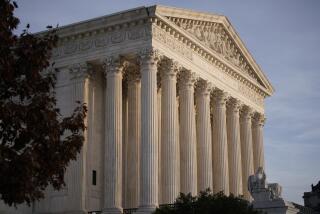Hearing Granted for Man Shackled While on Trial : Courts: Judge in rape case failed to show necessity of the measure, a federal appeals panel rules.
- Share via
SAN FRANCISCO — A man who was shackled during an Orange County rape trial and was thwarted by state and federal judges in his attempts to prove that jurors saw the shackles was granted a new hearing by a federal appeals court Monday.
The trial judge failed to show a need to shackle Lawtis Donald Rhoden during his trial, and neither he nor later courts gave Rhoden a fair chance to show that the shackling hurt his case, said the 9th U.S. Circuit Court of Appeals.
Rhoden was convicted of rape and two other sexual assault charges and sentenced to 12 years in prison in a June, 1984, incident involving a 17-year-old Anaheim woman.
According to a state appellate court, Rhoden drove alongside the woman, got her into car by saying he was a photographer who needed a model, and later had sex with her. She testified that he told her, “I don’t want to hurt you,” which she interpreted as a threat. The defense argued that she had consented.
Superior Court Judge Mason Fenton ordered Rhoden shackled by the legs during the trial, saying he was already serving a long prison sentence on unrelated charges, had other charges pending, had a black belt in karate and would have nothing to lose by trying to escape.
The state’s 4th District Court of Appeal ruled that neither those reasons nor Rhoden’s alleged non-cooperation with officers justified shackling him without evidence that he was a security risk and that lesser measures would be inadequate.
But the court upheld the convictions, saying there was no evidence that any jurors had seen the shackles. Rhoden had said he saw jurors looking at the shackles, and a defense investigator said he could see them from the jury box, but the state court said those statements were only speculation.
The court also denied a defense request for the names and addresses of the jurors. After Rhoden hired a private investigator who found the jurors, a defense lawyer told U.S. District Judge Gary Taylor that he had talked to three jurors who had seen the shackles. But Taylor said those statements were hearsay and were insufficient to overturn the conviction.
In Monday’s ruling, a three-judge federal appeals panel unanimously ordered Taylor to hold a hearing to determine whether jurors saw the shackles and, if so, whether the sight “threatened the fairness of the trial.”
The state court and Taylor “never gave (Rhoden) an adequate opportunity to demonstrate whether or not the jurors saw the shackles,” said the opinion by Judge Mary Schroeder.
Stephen Buckley, Rhoden’s former lawyer who had talked to the jurors, said Monday that he has “no doubt that they saw” the shackles. In a case that turned on the question of whether sex was the product of force or consent, he said, jurors could have been affected by the sight of the defendant in shackles.
Deputy Atty. Gen. David Warshaw said the state’s position was that jurors did not see the shackles, “or if they did it was only because he deliberately moved his chair so they could see them.”
More to Read
Sign up for Essential California
The most important California stories and recommendations in your inbox every morning.
You may occasionally receive promotional content from the Los Angeles Times.










